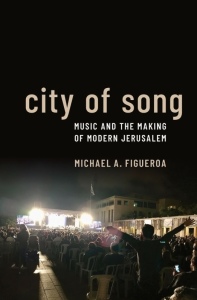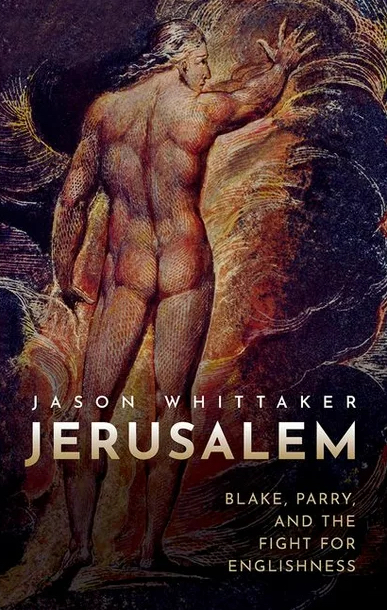You are currently browsing the tag archive for the ‘poetry’ tag.
City of Song: Music and the Making of Modern Jerusalem. Michael A. Figueroa. Oxford: Oxford University Press. 2022.
Reviewed by Tanya Sermer

Michael A. Figueroa’s captivating City of Song: Music and the Making of Modern Jerusalem is a book about Jerusalems—high/low, celestial/terrestrial, metaphorical/material—and how musical representations of the city have produced a multiplicity of political imaginaries about those Jerusalems in modernity. Combining an impressive array of interdisciplinary theory, historical and archival study, ethnographic fieldwork, and close listening to songs in Hebrew about the city, Figueroa creates a sophisticated framework for understanding how music and poetry (from the Psalms through Israeli popular song of the 1970s) have been used to create subjective and changing “spatial knowledge” about Jerusalem among Zionist Jews and Israelis over the course of the twentieth century. Presenting a remarkably nuanced exploration of the contested meanings inherent in cultural output regarding the city, Figueroa is deliberate in his relational approach to the people and spaces in his study; discussions of Jerusalem throughout the book consider the perspectives and concerns of Palestinian Arabs, Armenians, or ethnic and religious divisions within the Jewish and Israeli populations. Figueroa’s commitment to a relational approach—a growing body of such scholarship in musical studies of Israel and Palestine that aims to break down the mutual exclusion of those two national narratives as well as the conventional dichotomies within them—offers the reader a rich picture of the social and political forces at play and the greater implications of the territorial imaginaries that underpin the songs Figueroa examines.
Read the rest of this entry »“Ya Shema Evoynecha,” performed by Carla Berg, original poem in Hebrew by Yehuda Halevi, Ladino lyrics by Rabbi Reuven Eliyahu Yisrael, uploaded September 15, 2022, https://www.youtube.com/watch?v=v2QlJLkgeZw.
Reviewed by Lealiza Lee
The piyyut “Ya Shema Evoyonecha,” by Yehuda Halevi, is most widely known as a component of the Sephardic selichot service. Carla Berg is a vocalist who brings to light a long-forgotten Ladino version of the piyyut in a recording released for Rosh-Hashana.
Read the rest of this entry »Jerusalem: Blake, Parry, and the Fight for Englishness. Jason Whittaker. Oxford, UK: Oxford University Press. 2022.
Reviewed by Benjamin Wolf

This is a book about a single poem and a single song: William Blake’s poem, Jerusalem (“And did those feet in ancient time walk upon England’s mountains green”), and Hubert Parry’s famous setting of it. This combination of words and music has been central to British (perhaps it is better to say English) cultural life since Parry’s composition was first performed in 1916. Although originally composed for “Fight for Right,” an organization that supported Britain’s war efforts, it was subsequently adopted by the women’s suffrage movement, the Women’s Institute, and by figures on both the left and right of the political spectrum. Jason Whittaker traces this history, and the possible cultural meanings of both Blake’s poem and Parry’s setting of it, over a two-hundred-year period, ending in the Britain of the 2011 royal wedding, the 2012 Olympic Games and the 2016 Brexit referendum. Where British musical history is concerned, this book takes a valuable place alongside others such as Andrew Blake’s The Land without Music or Hughes and Stradling’s more cynical The English Musical Renaissance 1840 – 1940. [1]
Read the rest of this entry »
